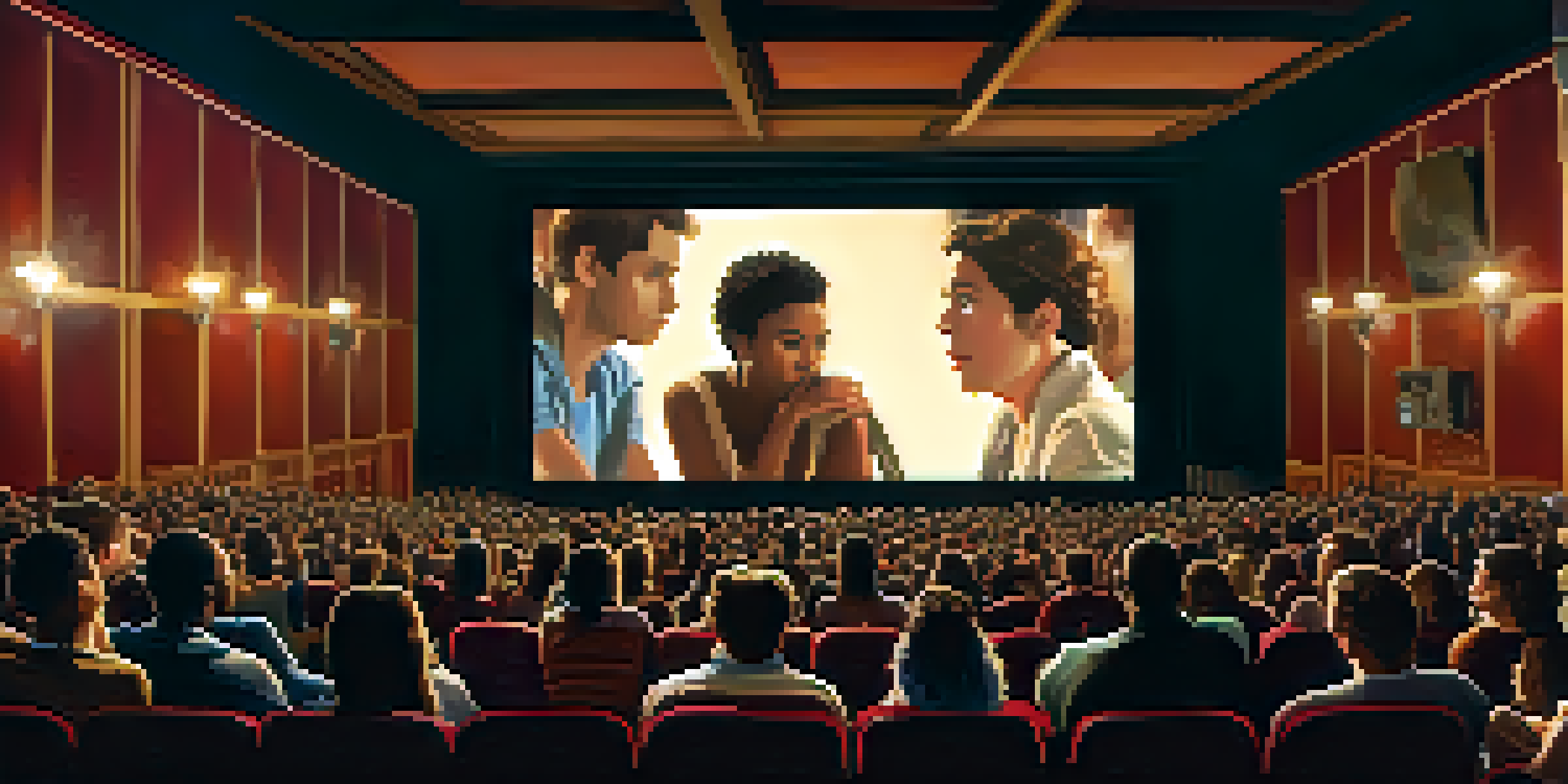The Ethics of Using Real Events in Hollywood Films

Understanding the Appeal of True Stories in Film
Movies based on real events captivate audiences with their authenticity and emotional depth. When filmmakers draw from true stories, they often tap into universal themes of struggle, triumph, and human resilience. These narratives resonate strongly because they remind viewers of the complexities of life, making them feel more connected to the characters and events portrayed.
The best stories are those that are true, for they are rooted in the reality of our human experience.
Moreover, the real-life aspect adds a layer of intrigue that fictional films might lack. People are naturally curious about the events that shape our world, and films that depict these moments can spark important conversations. This blend of entertainment and education can be incredibly powerful, allowing audiences to engage with history in a compelling way.
However, the allure of true stories also raises questions about the accuracy and representation of the events depicted. While dramatization can enhance storytelling, it can also lead to misinterpretations of facts, blurring the line between reality and fiction.
The Responsibility of Filmmakers in Storytelling
Filmmakers hold a significant responsibility when adapting real events. They have the power to shape perceptions and narratives, influencing how audiences understand historical figures or events. This responsibility requires a careful balance between creative license and respectful representation.

When a film takes liberties with the truth, it can perpetuate myths or distort the legacies of those involved. For instance, portraying a historical figure in a negative light without sufficient context can unfairly tarnish their reputation. It's crucial for filmmakers to consider the implications of their storytelling choices, especially when real lives and traumas are at stake.
Authenticity in True Stories
Movies based on real events resonate deeply with audiences due to their emotional depth and universal themes.
In this regard, consultation with historians, experts, and, when possible, those directly affected by the events can help ensure a more accurate and respectful portrayal. This collaborative approach can lead to a richer and more nuanced narrative that honors the true stories being told.
The Fine Line Between Entertainment and Exploitation
One of the most contentious issues in using real events in films is the potential for exploitation. When filmmakers prioritize entertainment over ethical storytelling, they risk trivializing serious issues, such as trauma or injustice. For example, dramatizing a tragic event for sheer shock value can come off as insensitive, overshadowing the real pain experienced by those involved.
Films are not just a reflection of reality; they shape how we perceive it.
Exploitation becomes even more problematic when the stories told lack the consent of the individuals or communities represented. This raises ethical dilemmas regarding ownership and representation, especially for marginalized groups whose narratives may be co-opted without their voices being heard. Filmmakers should strive to include these voices in the storytelling process to avoid misrepresentation.
Ultimately, the challenge lies in balancing the interests of storytelling with the need to honor the dignity of real-life experiences. Responsible filmmakers must navigate this landscape with care, ensuring that their work does not exploit but rather enlightens and informs.
The Impact of Historical Accuracy on Audience Perception
Historical accuracy plays a pivotal role in shaping audience perception of real events. When films take liberties with the truth, they can inadvertently create misconceptions that persist beyond the credits. For instance, a film may depict a historical event in a way that simplifies complex issues, leading viewers to form misguided opinions.
Moreover, the impact of films can extend far beyond individual viewers. A widely-seen movie can influence public discourse and collective memory, shaping how future generations understand history. Hence, filmmakers should consider the long-term implications of their portrayals, recognizing that their work can serve as a powerful educational tool.
Filmmakers' Ethical Responsibility
Filmmakers must balance creative storytelling with respectful representation to avoid misinterpretation and exploitation.
Conversely, when filmmakers prioritize accuracy, they can foster a more informed audience. Documentaries and biopics that present well-researched narratives encourage critical thinking and deeper engagement with historical events, empowering viewers to seek out more information and form their own opinions.
Navigating Ethical Challenges in Filmmaking
Navigating the ethical challenges of portraying real events requires thoughtful consideration and reflection. Filmmakers must ask themselves critical questions: Who is telling the story? What perspectives are included? Are they prioritizing entertainment over truth? This self-awareness can lead to more responsible storytelling practices.
Engaging with ethics in filmmaking can also involve setting clear boundaries around sensitive subjects. For instance, when depicting events involving violence or trauma, filmmakers must approach these topics with care and sensitivity. This includes avoiding sensationalism and being mindful of the emotional impact on audiences who may have personal connections to the events.
By acknowledging these challenges, filmmakers can create work that honors the complexities of real-life stories while still delivering compelling narratives. Striking this balance is essential for fostering trust with audiences and ensuring that the stories told are both impactful and respectful.
The Role of Audience Reception in Ethical Filmmaking
Audience reception plays a crucial role in shaping the ethical landscape of filmmaking. Viewers have the power to influence which narratives are deemed acceptable or problematic through their reactions and discussions. This collective voice can push filmmakers to be more mindful of the ethical implications of their storytelling choices.
When audiences express concern over a film's portrayal of real events, it can prompt filmmakers to reconsider their approach in future projects. This feedback loop encourages a more respectful engagement with sensitive subjects and fosters a culture of accountability within the industry. Filmmakers who listen to and learn from their audiences are more likely to create work that resonates positively.
Impact of Audience Reception
Audience feedback shapes ethical filmmaking by encouraging more mindful portrayals of real events and fostering accountability.
Additionally, audience engagement can lead to greater awareness of the real issues behind the stories being told. Documentaries and films that spark conversations about historical injustices or social issues can inspire viewers to take action, ultimately amplifying the impact of the stories beyond the screen.
The Future of Ethical Storytelling in Hollywood
Looking ahead, the future of ethical storytelling in Hollywood may hinge on embracing diversity and inclusivity in filmmaking. By prioritizing voices from a variety of backgrounds, filmmakers can create more authentic representations of real events. This shift can lead to narratives that are not only compelling but also reflective of the complexities of the human experience.
As audiences become more discerning, there's an increasing demand for films that respect the integrity of real stories. This evolving landscape encourages filmmakers to take ethical considerations seriously, leading to a more conscientious approach to storytelling. The industry is beginning to recognize that ethical filmmaking is not only a moral obligation but can also enhance the overall quality and impact of a film.

Ultimately, the journey toward ethical storytelling is ongoing. Filmmakers must continue to engage in dialogue, challenge their practices, and remain open to feedback. By doing so, they can contribute to a cinematic landscape that respects the past while inspiring future generations.